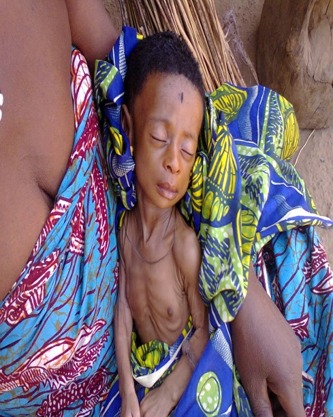The Upper West Regional Directorate of the Ghana Health Service (GHS) has identified Open defecation (OD) as a contributing factor to the malnutrition situation among children in the Region.
According to the Ghana Demographic and Health Survey (GDHS) in 2022, 52 per cent of Ghanaians practised OD, a situation the GHS said was worrying.
Mr Yussif Abubakari of the Nutrition Unit, Wa Municipal Health Directorate, said this in a presentation during a Regional Inter-agency Coordinating Committee on Sanitation (RICCS) meeting in Wa.
He said Water, Sanitation and Hygiene (WASH) played a major role in improving nutrition outcomes saying, “You can have good food to eat, but when there is an infection the nutrients cannot be absorbed properly.”
Data from the Environmental Health and Sanitation Department (EHSD) indicates 815 out of 1,167 communities in the region had attained Open Defecation Free (ODF) status with 13 ODF communities recorded in 2022 while no community had attained ODF status in the region in the first half of 2023.
“When there is open defecation a lot of it goes into the streams where people fetch water from, and you can get infections through that and when there are infections the absorption of nutrients within the human system is affected.
Once your system cannot absorb all the nutrients directly from the food, it means that the body will not get the required quantity of nutrients to function as required,” Mr Abubakari explained.
He indicated that children suffered the brunt of OD because they needed more nutrients to grow and once their system could not absorb it from the food due to infection resulting from OD, that would create a nutritional gap leading to under nutrition conditions such as stunting and wasting among children.
Other causes of malnutrition he mentioned were poor exclusive breastfeeding, late initiation of breastfeeding and high food insecurity, among others.
Mr Dennis Menance Bayuo, the Upper West Regional Focal Person on WASH, observed that it was imperative for concerted efforts between stakeholders to address environmental issues to improve the health and well-being of the people in the region.
He emphasised the need for increased and well-coordinated interventions between the stakeholders to improve the sanitation situation at the community level including access to toilet facilities.
Mr Issahaque Serikpera Naa, the Chief Executive Officer (CEO) of Yison Tech Hub, said the Hub was working in the Nandom and Lambussie Districts in partnership with the Netherlands Development Organisation (SNV) to improve access to clean sanitation services in 20 communities. The Global Communities, Vibrant Village Foundation, SNV and the Centre for Advancing Rural Opportunities (CARO)-Ghana among others also presented their interventions towards improving access to WASH in the region.
Latest Stories
-
Damanag lease extension: We continue to seek ongoing engagement with government – Gold Fields
9 minutes -
Walter tipped as favourite to win UPSA Law School presidential race
24 minutes -
Ato Forson elected Chairman of ECOWAS Bank Board of Governors
26 minutes -
Kumasi Metro CEO talks tough in building city on foundation of discipline
36 minutes -
3 schools qualify for grand finale of Luv FM Primary Schools Quiz
49 minutes -
New gold trading law targets smuggling, formalisation in sector – GoldBod
51 minutes -
KMA Mayor to resort to instant corporal punishment to decongest the city
1 hour -
Lands Minister commissions 453 Blue Water Guards, charges them to uphold professionalism
2 hours -
Eunice Amoo-Mensah: Revolutionising pension funds in Ghana through securities lending
2 hours -
Madina MP Sosu granted full membership in African Court Coalition
2 hours -
Blue Origin crew safely back on Earth after all-female space flight
2 hours -
Supreme Court to begin hearing injunction application against procedure to remove CJ on April 16
2 hours -
Strong macroeconomy key to sustaining Ghana’s capital market – Stanbic Executive
2 hours -
African Leaders should respond to the shifting global trade dynamics – WTO DG
2 hours -
Tamale accounts for bulk of NEDCo’s power losses – Energy Minister
2 hours

